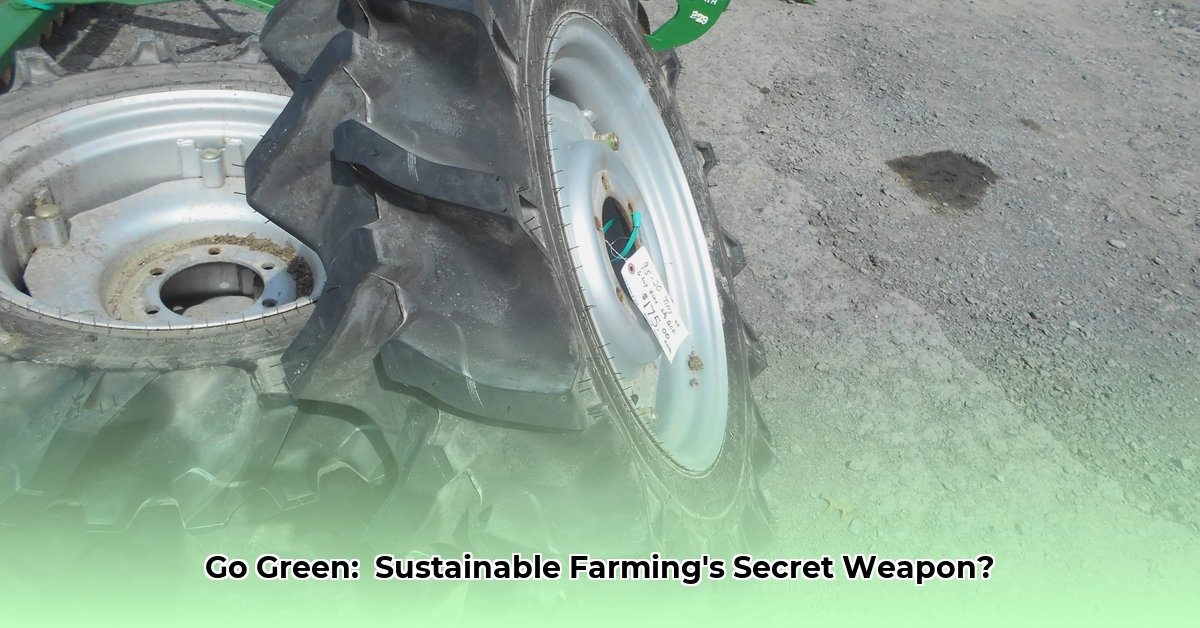
The Environmental Impact of Agricultural Tires
Agricultural practices significantly impact the environment. A often-overlooked contributor is the humble tractor tire, particularly larger sizes like the ubiquitous 9.5-20. Tire manufacturing consumes energy and resources, while improper usage contributes to soil compaction and reduced yields. Disposing of worn-out tires also presents environmental challenges, adding to landfill burdens. Adopting sustainable practices concerning these essential components is paramount for environmentally conscious farming. How can we minimize the negative impacts while maintaining operational efficiency? For larger tires, consider options like 24-inch tractor tires.
Understanding 9.5-20 Tractor Tires
9.5-20 tires are a standard size for many tractors and implements, commonly used in various agricultural settings. The "9.5" denotes the tire's width in inches, while "20" represents the diameter. This size offers versatility, suitable for a range of tasks. However, tire selection should align with the specific application and terrain. Consult your tractor's manual for recommended tire size and pressure to optimize performance and avoid damage. Tread patterns influence traction and soil compaction; deep treads provide superior grip in muddy conditions but increase compaction, while shallower treads are gentler on soil but may lack grip in challenging terrains. Tire construction—radial or bias-ply—further impacts durability, ride comfort, and fuel efficiency. Radial tires generally offer superior fuel efficiency and a smoother ride but come with a higher initial cost.
| Feature | Description |
|---|---|
| Size | 9.5-20 (9.5 inches wide, 20 inches in diameter) |
| Typical Use | Smaller and mid-sized tractors, various implements, diverse terrains |
| Tread Pattern | Numerous options; selection based on traction needs and soil compaction considerations |
| Tire Construction | Radial or bias-ply; affects durability, ride comfort, fuel efficiency, and cost |
| Load Capacity | Varies with inflation pressure and tire construction; consult your owner's manual |
Sustainable Practices with 9.5-20 Tires: An Instructional Guide
Sustainable farming necessitates responsible tire management. Here are actionable steps to minimize environmental impact:
1. Tire Pressure Management: Maintaining correct tire pressure is crucial. Underinflation increases fuel consumption and soil compaction, while overinflation reduces traction and can damage the tire. Regular pressure checks using a reliable gauge are vital. Aim for the manufacturer's recommended pressure for optimal performance and longevity.
2. Tire Maintenance and Repair: Regular inspections for cuts, bulges, embedded objects, and uneven wear can prevent major issues. Promptly address minor damage to extend tire lifespan. Routine maintenance can significantly reduce premature tire failure.
3. Choosing Sustainable Tires: Investigate tires made from recycled materials or designed for reduced soil compaction. Consider the entire life cycle impact when selecting tires; a slightly higher upfront cost might offer significant long-term gains in terms of sustainability and cost savings. Research new materials and tire designs emerging in the market.
4. Proper Disposal and Recycling: Responsible disposal is essential. Explore local tire recycling programs or inquire with manufacturers about environmentally friendly disposal options. Avoid adding to landfill waste by utilizing recycling resources.
Future Trends and Innovations in Sustainable Tire Technology
Ongoing research focuses on developing more sustainable agricultural tires. This includes investigating bio-based polymers and increasing the use of recycled rubber in tire construction. Innovations in tread design aim to reduce soil compaction further. These advancements promise significantly more eco-friendly options in the near future. The future of farming hinges on these crucial advancements in tire sustainability.
Resources and Further Reading
For additional information on sustainable agriculture and responsible tire management, consult resources from reputable organizations such as the American Society of Agricultural and Biological Engineers (ASABE), the United States Department of Agriculture (USDA), and leading agricultural universities. Stay informed about the latest advancements in tire technology and sustainable agricultural practices.
How to Choose Sustainable Tires for Efficient Farm Operations
Key Takeaways:
- Tire selection significantly impacts farm sustainability.
- Consider tire type, size, and tread pattern carefully.
- Proper inflation is critical for fuel efficiency and soil health.
- Regular maintenance lengthens tire lifespan, reducing waste.
- Explore sustainable tire options using recycled materials.
- Responsible disposal ensures minimal environmental impact.